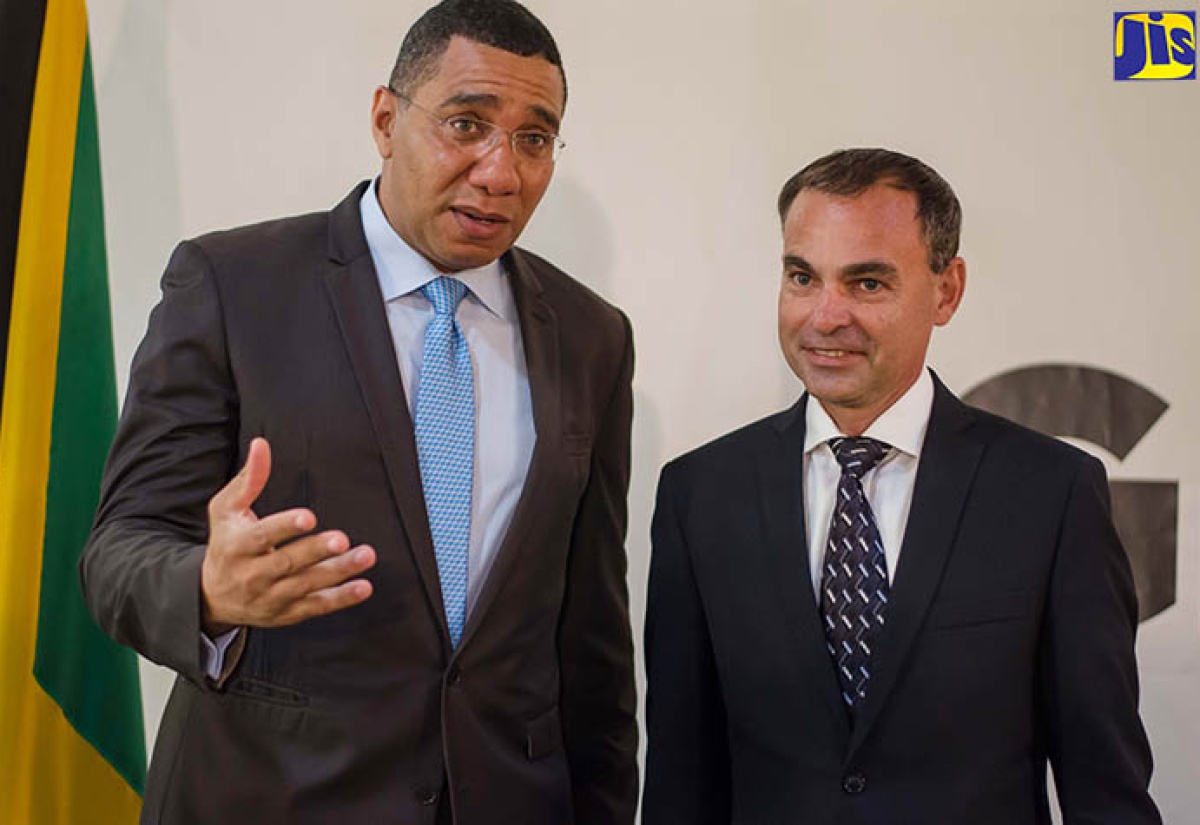PM Launches HOPE Programme
By: , May 8, 2017The Key Point:
The Facts
- The initiative is targeted at persons, aged 18 to 24, who are not employed or enrolled in a school or programme of training.
- Prime Minister Holness said all of Government will play a role, with some 300 youths to be placed at the National Water Commission to work under the entity’s Non-Revenue Water (NRW) Reduction Programme.
The Full Story
Prime Minister, the Most Hon. Andrew Holness, today (May 8) officially launched the Housing, Opportunity, Production and Employment (HOPE) programme, which will provide educational and job opportunities for young people.
The initiative is targeted at persons, aged 18 to 24, who are not employed or enrolled in a school or programme of training.
It is being headed by Lieutenant Colonel Martin Rickman, who is on secondment from the Jamaica Defence Force (JDF).
So far under the programme, some 15,000 apprenticeship spaces have been identified.
In his remarks, at the launch held at the Office of the Prime Minister, Mr. Holness said Lieutenant Rickman will be surveying the entire Government in order to identify opportunities where youngsters can be engaged.
“Those who do not have basic education … will be provided with opportunities for basic education, and those who are not trained will be provided with opportunities to develop employable skills,” he pointed out.
He added that the initiative will be managed under an apprenticeship framework, noting that the Government will be revising the National Apprenticeship Act.
Prime Minister Holness said all of Government will play a role, with some 300 youths to be placed at the National Water Commission to work under the entity’s Non-Revenue Water (NRW) Reduction Programme.
“You really need an army of youngsters moving around in the community. They have a device that has geolocation on it, and they will be able to map, by satellite, the exact geographic location of a meter,” Mr. Holness said.
He also informed that some 20 persons will also be placed at the Jamaica Information Service (JIS) under the programme.
Mr. Holness noted that the focus is on getting “our unattached youngsters into some form of training, life skill and character education development and into employment… that is beneficial for the people of the country and beneficial in improving the efficiency of Government”.
He said that liaison officers within the various ministries have been tasked with coming up with the programmes of work, which will then be passed on to the national coordinator.
“He will then identify the youngsters and put them through a process of training, (and) work out with you the protocol as to how they will be employed within your operations, their remuneration and their supervision,” he said.
He added that the Ministry of Education, Youth and Information, along with the merged agencies of HEART Trust/NTA, the National Youth Service (NYS) and the Jamaican Foundation for Lifelong Learning (JFLL), will be involved in the process.
Meanwhile, Prime Minister Holness said while focus is currently being placed on the employment section of the programme, the other components, such as housing, are being developed.
“There are some social programmes in that regard… . Those will be streamlined, and you will hear more about that as we go. There is the opportunity part, and that has to do mainly with creating avenues of affordable financing for business,” he indicated.
He added that the production element of the programme will rely heavily on the linkages between industries.
In his remarks, Lieutenant Rickman thanked the Prime Minister for giving him the opportunity to work on a programme that will be of tremendous value to the Jamaican youth.
He noted that the HOPE programme is intended to provide an avenue for the development of fully rounded individuals, who have the social, academic and technical skills to become productive members of the society.
“There are currently 130,000 youths that are not engaged in any meaningful way. They are often described as unattached, at-risk with low self-worth and low self-esteem, and who are vulnerable to getting involved in nefarious activities; and they often do,” he pointed out.
Lieutenant Rickman said the HOPE programme will buttress all the efforts across Government to engage these unattached youths in a meaningful way.
He noted that all existing programmes will be rationalised and streamlined, so that there will be more effective coordination of effort, resources and leadership for greater impact and to ensure the desired outcomes are achieved.
“The basic idea is that all participants will be trained in a core programme comprised of life skills, cultural awareness, volunteerism and mentorship, and then be given the specific skills training, after which they will be allowed to work in that skill area for a stipend with a savings component,” he outlined.
After this meaningful engagement, which will be for a minimum of one year, it is the intent that the interns will then be released into the workforce with improved attitudes and skills and a foundation on which they can build for further employment, training or education.
Lieutenant Rickman said opportunities have already been identified in areas such as document management and digitising, environmental management, geographic information systems, infrastructure and construction, registration, verification and audit, hospitality and national service enlistment in the JDF.
“This is not simply about providing work for individuals for a period of time; this is about meaningfully giving the participants a sense of purpose, to show them their place in society and how they will be able to contribute to the prosperity of their country,” he noted.


